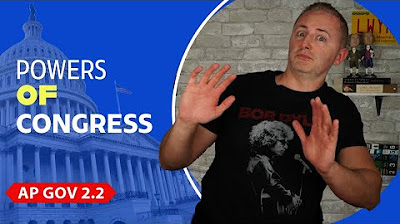Congressional Leadership: Crash Course Government and Politics #8
Summary
TLDRCrash Course Government and Politics explores the intricate leadership structure of Congress, highlighting key figures like the Speaker of the House and Senate Majority Leader. The video explains how these leaders, often elected by the majority party, wield significant influence through committee assignments, agenda setting, and media access. It also touches on the role of political parties in shaping legislation and maintaining discipline, emphasizing the impact of party unity on Congress's efficiency and the public's perception of government actions.
Takeaways
- 🏛️ The Congressional leadership includes roles such as Majority Leader, Minority Whip, and they are closely tied to political parties.
- 🗣️ The Speaker of the House is the third most powerful person in the U.S. and is elected by the majority party every two years.
- 📊 The Majority Whip's role is to count votes and ensure party members vote in line with the party's stance.
- 🔝 The House Majority Leader is chosen by the Speaker and is influential within the party, often due to popularity with certain factions.
- 🔉 The Minority Party also has leadership roles, including a Minority Leader who acts as the party's spokesperson.
- 🌐 The Senate's leadership structure is simpler with the Majority Leader and Minority Leader, and the Vice President presiding over sessions.
- 💼 Congressional leaders exercise power through committee assignments, shaping the legislative agenda and rewarding or punishing members.
- 📰 Leaders have greater access to the press, which they use to set the public agenda and maintain influence.
- 💵 They also wield power through fundraising and campaign finance, directing money to key races and influencing colleagues.
- 🤝 Political parties are crucial in Congress for organizing, setting agendas, and providing a framework for cooperation and discipline among members.
- 🤔 The unity of a political party can significantly impact the leadership's ability to set and推进 an agenda, as seen with the challenges faced by Speaker Boehner and the Tea Party Movement.
Q & A
Who are considered the leaders in Congress?
-The leaders in Congress are those with titles such as Majority Leader, Minority Whip, and others who play significant roles within their respective political parties.
What is the significance of the Majority Leader and Minority Whip in the House of Representatives?
-The Majority Leader and Minority Whip are key figures in the House of Representatives. The Majority Leader is responsible for managing the legislative agenda and ensuring party discipline, while the Minority Whip assists the Minority Leader in counting votes and maintaining party unity.
Who is the third most powerful person in the United States according to the script?
-The Speaker of the House of Representatives is considered the third most powerful person in the United States.
How often are the elections for the Speaker of the House held?
-Elections for the Speaker of the House are held every two years, coinciding with the election of the entire House of Representatives.
What is the role of the Majority Whip in the House?
-The Majority Whip's primary task is to count votes on important legislation and ensure that party members vote in line with their party's stance.
Who presides over the Senate sessions, and what is their role?
-The Vice President of the United States presides over the Senate sessions, although this is one of their few official constitutional duties.
What is the President pro tempore's role in the Senate?
-The President pro tempore presides over the Senate in the absence of the Vice President and is typically the most senior member of the majority party.
How do Congressional leaders exercise power in terms of committee assignments?
-Leaders exercise power by assigning members to committees, which allows them to ensure their views are represented and to reward or punish members with desirable or undesirable committee assignments.
What is the significance of the House Rules Committee in shaping the agenda of Congress?
-The House Rules Committee is significant because it decides how debate will occur in the House, including the duration of debate and whether amendments will be allowed.
How does the majority party's control of Congress impact the legislative process?
-The majority party's control of Congress ensures that they have a majority on all important committees, choose the committee chairs, and thus have a significant influence over the legislative agenda.
What challenges can lack of party unity pose to Congressional leadership?
-Lack of party unity can make it difficult for leadership to set and maintain an agenda, as seen with the Tea Party Movement's impact on Speaker Boehner's ability to lead in 2011.
How does the media's interaction with Congressional leaders influence the public's perception of political issues?
-Congressional leaders have greater access to the press, particularly TV, which allows them to set the public agenda by determining which issues are discussed and highlighted in the media.
Outlines

Этот раздел доступен только подписчикам платных тарифов. Пожалуйста, перейдите на платный тариф для доступа.
Перейти на платный тарифMindmap

Этот раздел доступен только подписчикам платных тарифов. Пожалуйста, перейдите на платный тариф для доступа.
Перейти на платный тарифKeywords

Этот раздел доступен только подписчикам платных тарифов. Пожалуйста, перейдите на платный тариф для доступа.
Перейти на платный тарифHighlights

Этот раздел доступен только подписчикам платных тарифов. Пожалуйста, перейдите на платный тариф для доступа.
Перейти на платный тарифTranscripts

Этот раздел доступен только подписчикам платных тарифов. Пожалуйста, перейдите на платный тариф для доступа.
Перейти на платный тарифПосмотреть больше похожих видео

Structures, Powers, and Functions of CONGRESS [AP Gov Review, Unit 2 Topic 2 (2.2)]

The Bicameral Congress: Crash Course Government and Politics #2

AP Gov 2.2.1 | Structures, Powers, & Functions of Congress | NEW!

What Is the Legislative Branch of the U.S. Government? | History

Congress.gov: Calendars and Scheduling

Congressional Elections: Crash Course Government and Politics #6
5.0 / 5 (0 votes)
